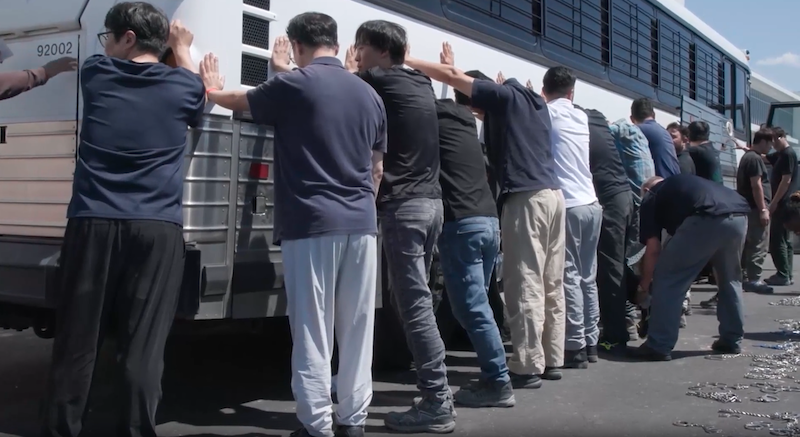On September 4, ICE conducted a raid at the Hyundai-LG battery plant under construction in Ellabell, Georgia — detaining 475 foreign workers, most of them South Korean.
The employees were hired through subcontractors for Hyundai and LG’s Georgia battery plant. Some were shown being shackled with chains around their hands, ankles and waists in a video released by the U.S. Immigration and Customs Enforcement.
Agents say the operation targeted suspected visa violations; contractors and specialists, including engineers and installers working under B-1 business visitor visas, were among those held.
The raid, described as the largest single-site enforcement action in U.S. Homeland Security history, has sparked diplomatic outrage and raised questions about how “authorized work” is defined in practice.
President Lee Jae Myung warned Thursday that Korean companies may think twice about their U.S. investments unless Washington reforms its visa policies.
“It’s not like these are long-term workers,” Lee said. “When you build a facility or install equipment at a plant, you need technicians, but the U.S. doesn’t have that workforce and yet they won’t issue visas to let our people stay and do the work.”
Did Hyundai subcontractors break U.S. immigration laws?
Attorneys say there is no clear evidence Hyundai’s subcontractors violated U.S. immigration laws.
Loren Locke, a former U.S. diplomat and founder of Locke Immigration Law noted that South Koreans qualify for visa waiver travel under ESTA, which allows them to enter the U.S. for up to 90 days without first applying for a visa.
“They do not need to disclose their travel plans, and it’s up to them, together with their employers and legal counsel, to make sure that they perform activities that fall within the bounds of a ‘business visitor,’” Locke said.
She explained that what counts as permissible “business visitor” activity is highly nuanced and not something that can easily be determined during an ICE raid — particularly one conducted without interpreters present.
“In the case of this raid, it’s very likely that many of the detained business visitors were here to do the permissible business visitor activity ‘install, service, or repair commercial or industrial equipment or machinery purchased from a company outside the U.S.,’” Locke said.
“Before this unprecedented huge raid, it would not have been seen as particularly risky to send over workers to perform limited duties as business visitors,” she added.
Still, Locke pointed out that a large multinational such as Hyundai could have relied on a corporate L-1 blanket petition to quickly transfer employees to the U.S.
What is the message for international companies?
“Visa type matters; using a tourist or business visa for labor puts you at risk of detention,” said Marina Shepelsky, founder of Shepelsky Law Group.
Given the scale of Hyundai’s investment, the raid was far from routine. The Georgia battery plant is part of a $12.6 billion project — the largest in the state’s history — tied to a $21 billion U.S. expansion announced in March amid rising Trump-era tariffs.
“The government wanted to send a message: large projects employing foreign nationals will be closely scrutinized,” said Shepelsky.
Beyond large corporations such as Hyundai, visa challenges pose enduring barriers for startups, said Kenneth Huynh, managing partner at Elpis Labs, a New York–based accelerator for international founders.
In September, his firm completed an acceleration program for 10 Korean startups with a combined $50 million in revenue and funding.
According to Huynh, talent is the oxygen of any startup, and in the U.S., accessing and retaining that talent has become the real bottleneck.
“It remains easier to move avocados across borders than machine learning engineers,” Huynh said.
“If the U.S. wants to stay the world’s top destination for global founders, then clear immigration policies and access to skilled talent can’t be afterthoughts.”
At a meeting in Washington this week, Hyundai, LG and other firms urged U.S. and South Korean officials to make South Koreans eligible for E-4 visas, a category already open to free trade partners including Mexico, Canada, Singapore and Australia.








